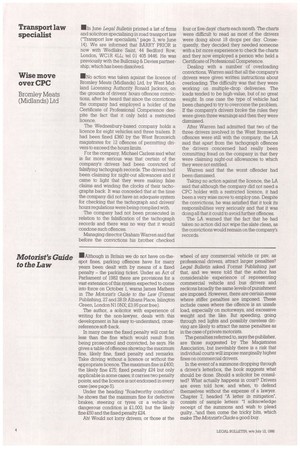Wise move over CPC
Page 30

If you've noticed an error in this article please click here to report it so we can fix it.
Bromley Meats (Midlands) Ltd
MINo action was taken against the licence of Bromley Meats (Midlands) Ltd, by West Midland Licensing Authority Ronald Jackson, on the grounds of drivers' hours offences convictions, after he heard that since the convictions the company had employed a holder of the Certificate of Professional Competence despite the fact that it only held a restricted licence.
The Wednesbury-based company holds a licence for eight vehicles and three trailers. It had been fined £360 by the West Bromwich magistrates for 12 offences of permitting drivers to exceed the hours limits.
For the company, Michael Carless said what is far more serious was that certain of the company's drivers had been convicted of falsifying tachograph records. The drivers had been claiming for night-out allowances and it came to light that they were making false claims and winding the clocks of their tachographs back. It was conceded that at the time the company did not have an adequate system for checking that the tachograph and drivers' hours regulations were being complied with.
The company had not been prosecuted in relation to the falsification of the tachograph records and there was no way that it would condone such offences.
Managing director Graham Warren said that before the convictions his brother checked four or five days charts each month. The charts were difficult to read as most of the drivers were doing about 18 drops per day. Consequently, they decided they needed someone with a bit more experience to check the charts and they now employed a person who held a Certificate of Professional Competence.
Dealing with a number of overloading convictions, Warren said that all the company's drivers were given written instructions about overloading. The difficulty was that they were working on multiple-drop deliveries. The loads tended to be high-value, but of no great weight. In one case the type of vehicle had been changed to try to overcome the problem. If the company's drivers broke the rules they were given three warnings and then they were dismissed.
After Warren had admitted that two of the three drivers involved in the West Bromwich offences were still with the company, the LA said that apart from the tachograph offences the drivers concerned had really been committing fraud on the company in that they were claiming night-out allowances to which they were not entitled.
Warren said that the worst offender had been dismissed.
Taking no action against the licence, the LA said that although the company did not need a CPC holder with a restricted licence, it had been a very wise move to employ one. Despite the convictions, he was satisfied that it took its responsibilities very seriously and that it was doing all that it could to avoid further offences.
The LA warned that the fact that he had taken no action did not wipe the slate clean, as the convictions would remain on the company's records.




















































































